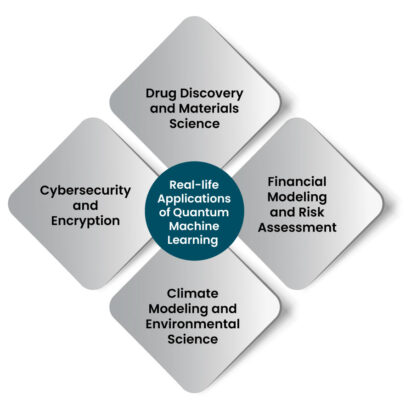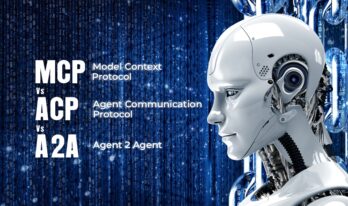At its heart, quantum machine learning blends two revolutionary fields: quantum physics and data science. It reimagines how computers can learn patterns by harnessing the bizarre behaviors of subatomic particles—where things can exist in varied states at the same time and influence each other across distances instantly.
Imagine teaching a computer to recognize faces, but instead of checking features one by one, it examines all possible combinations at once. That's the quantum advantage: these systems use special properties like superposition and entanglement to process information in ways traditional computers simply cannot.
It is utterly fascinating when theory turns into practice. Researchers are designing algorithms that are meant to be run on quantum computers that are able to discover hidden patterns in vast datasets, optimize complicated systems like traffic patterns or financial portfolios, and even help to discover new materials and medicines.
While still developing, this field promises to transform how we tackle our most difficult computational challenges. Let us learn in detail about it in the following blog:
What Is Quantum Machine Learning?
Quantum Machine Learning (QML) involves the intersection of quantum computing paradigms and statistical learning frameworks. It leverages quantum mechanical phenomena like superposition, entanglement, and quantum interference to enhance computational learning processes. QML algorithms exploit Hilbert space representations and quantum gates to implement kernel methods.
Core QML approaches include variational quantum circuits (VQCs), quantum neural networks (QNNs), and quantum kernel methods that transform classical data into quantum states through amplitude encoding or qubit rotations. These techniques enable quantum advantage in certain computational bottlenecks of machine learning, particularly in high-dimensional optimization landscapes.
The field encompasses both quantum-enhanced classical algorithms and full quantum implementations, with applications spanning quantum principal component analysis, quantum support vector machines, and quantum generative models. Current research focuses on noise mitigation techniques for NISQ (Noisy Intermediate-Scale Quantum) devices, quantum feature selection strategies, and barren plateau avoidance.
How Does Quantum Machine Learning Work?
Quantum Machine Learning leverages quantum physics to change the way computers process information. At the core of this revolution is a concept called superposition. Here the particles can exist in a plethora of states at the same time. With quantum computers, this allows the computer to evaluate all possibilities at the same time rather than one after another.
This parallelism enables exponentially faster processing of complex calculations that would overwhelm traditional computers. Quantum entanglement creates mysterious connections between particles, allowing them to share information instantaneously regardless of distance. In machine learning applications, this property is useful for creating sophisticated models by increasing the connections between different data points.
This is further enhanced by quantum interference that amplifies correct solutions and suppresses incorrect ones. Workflow usually begins by encoding classical data in quantum states via methods such as amplitude encoding or qubit rotations. Quantum states are then manipulated using specialized quantum circuits for pattern extraction or specific calculations.
The process concludes with measurement, which collapses quantum states into classical results that can be interpreted and used for predictions or classifications. Current implementations frequently adopt hybrid approaches. Variational quantum circuits, for instance, use classical optimization to tune quantum parameters, allowing researchers to develop practical applications even with today's imperfect quantum hardware.
Real-life Applications of Quantum Machine Learning
Drug Discovery and Materials Science: A millions of potential compounds can be screened by the researchers in a very short period of time than traditional methods require, identifying candidates for treatments for diseases like cancer or Alzheimer's. The strategy has already had a massive impact on the discovery of new materials with certain properties, drastically changing battery technology, sustainable production, and other areas.
Financial Modeling and Risk Assessment: Investment companies have begun to implement QML algorithms. The aim is to analyze market patterns and optimize trading strategies at an unprecedented speed. By modeling complex market dynamics in a more accurate manner, financial institutions can better manage risk and optimize portfolios. With more precision than before, they can predict market movements.
Climate Modeling and Environmental Science: By processing enormous datasets from satellites, ocean sensors, and atmospheric readings, QML algorithms can identify hidden patterns in climate dynamics. This computational power leads to more precise forecasts of the weather extremes, monitoring of environmental changes, and getting insights to develop successful climate change mitigation strategies.
Cybersecurity and Encryption: Quantum-enhanced algorithms can detect unusual patterns in network traffic that might indicate attacks, even those using sophisticated techniques to avoid detection. Simultaneously, QML helps develop post-quantum cryptography—encryption methods secure against both classical and quantum attacks—ensuring digital communications remain protected in the quantum computing era.
Shortcomings of Quantum Machine Learning:
Hardware Limitations and Noise: Qubits maintain their delicate quantum states for mere microseconds before environmental interference causes errors. Engineers must operate these systems at temperatures colder than deep space and shield them from even minimal electromagnetic interference, making scalable quantum machines extraordinarily difficult to build and maintain.
Algorithm Development Hurdles: Researchers struggle to translate classical machine learning concepts into the quantum realm. Advanced linear algebra is combined with quantum physics principles unfamiliar to most computer scientists. This knowledge gap has slowed progress, with many promising theoretical approaches failing during practical implementation.
Data Encoding Bottlenecks: Converting classical information into quantum states is often time-consuming and proportional to the size of the data, and it potentially eliminates speed gains from quantum processing. Researchers face the challenge of efficiently transferring large datasets into a quantum format, which has not been resolved.
Verification and Interpretability Problems: The probabilistic nature of quantum measurements makes outputs inherently uncertain. The lack of interpretability of such systems raises serious issues regarding the use of quantum machine learning in safety-critical applications such as healthcare or autonomous systems.
Looking Ahead!
An impending quantum revolution is upon us. The boundaries of computation are about to dissolve. Quantum Machine Learning is more than a new tool; it's a new possibility. Decades from now, with mature hardware and new algorithms, we might see possibilities that are not even available now. The centuries-old questions of scientific inquiries may finally see a resolution.
Though challenges remain, the trajectory is clear: those who master the quantum-classical interface will reshape industries, redefine scientific discovery, and ultimately transform our understanding of intelligence itself. To learn more about QML, artificial intelligence, and the latest technologies, visit us at WisdomPlexus!
Recommended For You:
AI-Powered Underwriting: Transforming the MGA’s Underwriting Process with Machine Learning
Image Annotation Explained: For Machine Learning and Computer Vision





